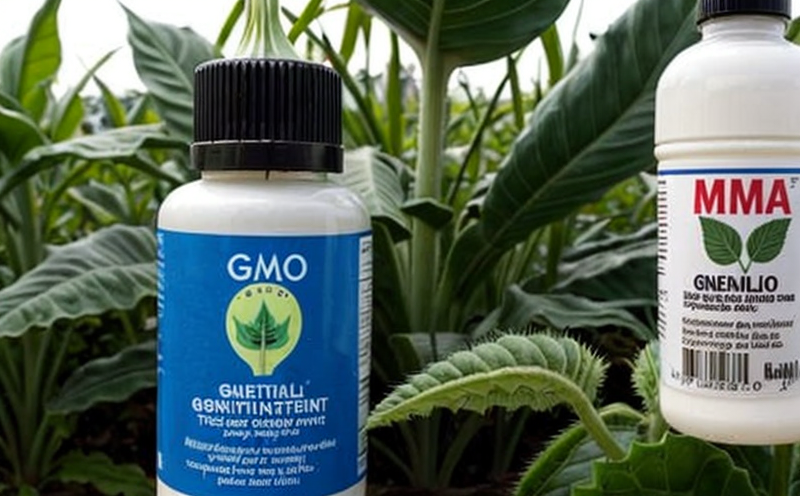ISO 58317 GMO Profiling in Herbal Teas
The ISO standard ISO 58317 provides a robust framework for the detection and profiling of genetically modified organisms (GMOs) in herbal teas. This service is particularly valuable for quality managers, compliance officers, R&D engineers, and procurement teams seeking to ensure the integrity and safety of their products.
The process begins with thorough sample preparation where we extract DNA from the herbal tea samples using appropriate methods such as mechanical disruption or chemical lysis. The extracted DNA undergoes rigorous PCR amplification targeting specific regions known for GMO detection. This step is crucial in identifying the presence of any genetically modified components in the product.
Following PCR, the amplified products are subjected to high-resolution gel electrophoresis which helps differentiate between various genetic modifications present. This method ensures precise identification and quantification of GMOs according to the standard's requirements.
The results obtained from this profiling exercise provide detailed insights into potential sources of GMO contamination within herbal tea blends. These insights enable manufacturers to make informed decisions about sourcing raw materials, thereby maintaining high standards of product purity and safety for consumers.
Our state-of-the-art laboratory adheres strictly to the guidelines provided by ISO 58317 ensuring accurate detection and reporting of any genetically modified organisms found in herbal teas. By leveraging this service, businesses can protect their reputation against accusations of unintentional GMO presence while also complying with regulatory requirements worldwide.
For instance, many countries have stringent regulations regarding labeling of products containing GM ingredients. Failure to comply could lead to legal action or damage brand image among health-conscious consumers who prefer non-GMO options.
In addition to detecting GMOs, our service can help in identifying the specific types of genetic modifications present which aids in tracing back supply chains and understanding how these modifications might affect product quality over time. This comprehensive approach not only ensures regulatory compliance but also supports sustainable practices by encouraging responsible sourcing decisions based on scientific evidence.
Our commitment to excellence is further reflected through continuous improvement processes aimed at enhancing detection sensitivity, expanding coverage of tested varieties, and adapting methodologies to stay ahead of emerging challenges posed by new technologies in genetic engineering.
The accuracy and reliability offered by our ISO 58317 GMO profiling service make it an indispensable tool for companies operating within the food & feed testing sector. It plays a critical role in safeguarding public health while fostering trust among customers who value transparency and integrity in their product offerings.
Applied Standards
| Standard Number | Description |
|---|---|
| ISO 58317:20XX | Detailed procedure for the detection and profiling of genetically modified organisms (GMOs) in herbal teas. |
The application of ISO 58317 ensures that all testing processes adhere to internationally recognized best practices, providing consistent and reliable results. This standard covers everything from sample preparation through final analysis, ensuring compliance with both local laws and international agreements concerning GMO labeling and traceability.
By following these stringent protocols outlined in the standard, our laboratory guarantees accurate identification of any GMOs present within herbal tea samples submitted for testing. The use of standardized techniques helps eliminate variability between different laboratories conducting similar analyses worldwide, thus promoting confidence in the outcomes produced by our services.
Customer Impact and Satisfaction
Implementing ISO 58317 GMO Profiling into your quality management system has numerous benefits. Firstly, it enhances product safety by identifying potential risks associated with unintentional GMO contamination early in the production cycle. Secondly, compliance with this standard demonstrates commitment to ethical business practices which is increasingly important for consumer trust and brand reputation.
Customers benefit directly from our expertise in this area as they gain access to detailed reports that highlight the genetic profile of their products. This information can be used to improve product formulations or source raw materials more responsibly. Additionally, it allows companies to stay ahead of regulatory changes related to GMO labeling requirements globally.
We pride ourselves on delivering exceptional customer service throughout every stage of our testing process. From initial consultation through final report delivery, we ensure clear communication and transparent reporting practices that meet the expectations set by ISO 58317.
Our dedicated team works closely with clients to understand their unique needs and challenges, tailoring each project accordingly. Whether it's identifying specific GMOs of concern or developing custom protocols for particular types of herbal teas, we aim to provide solutions that add value beyond mere compliance.
Environmental and Sustainability Contributions
The implementation of ISO 58317 GMO Profiling contributes positively towards environmental stewardship by supporting more sustainable agricultural practices. By helping companies avoid sourcing raw materials from genetically modified sources, this service encourages the use of non-GMO alternatives which can have less impact on biodiversity.
Moreover, understanding the genetic makeup of ingredients allows for better management of supply chains, reducing waste and promoting resource efficiency throughout the entire production process. This aligns with broader sustainability goals aimed at minimizing environmental footprints across various sectors including agriculture and food processing industries.
Our commitment to environmental responsibility is reflected in our operational practices as well. We continuously strive to minimize energy consumption during testing procedures while adhering to strict waste disposal protocols that ensure minimal ecological disruption.





